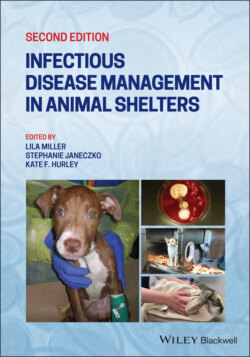Читать книгу Infectious Disease Management in Animal Shelters - Группа авторов - Страница 55
2.5.5 Proper Nutrition and Physical Exercise
ОглавлениеProper nutrition and exercise have profound implications for wellness. Not only are they essential for the management of healthy body weight and condition, good nutrition also supports immune function and regular physical exercise is closely associated with behavioral health and well‐being. A regular diet of good‐quality, palatable commercial food consistent with life stage and health status should be offered, and appetite should be monitored to ensure the maintenance of an adequate nutritional plane. Animals that do not eat for more than one to two days should be evaluated for medical problems and stress, and appropriate action should be taken based upon the findings. In addition, fresh water must always be available. Finally, animals should be weighed at intake and at routine intervals throughout their shelter stay. This is especially important for undernourished animals, including those involved in starvation cruelty cases and for cats because significant or even dramatic weight loss may be associated with stress and/or feline upper respiratory infection (URI) during the first few weeks of confinement (Tanaka et al. 2012). On the other hand, excessive weight gain may occur in some individual animals housed long term. Ideally, bodyweight should be recorded weekly during the initial month of shelter care and then once a month or more often if indicated. Protocols must be in place to identify and manage unhealthy trends in body weight that can potentially compromise an animal's health, well‐being, or adoption.
